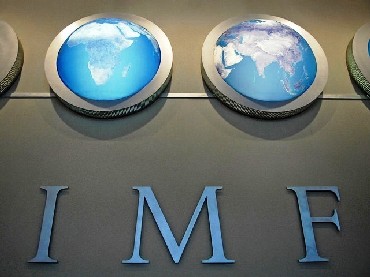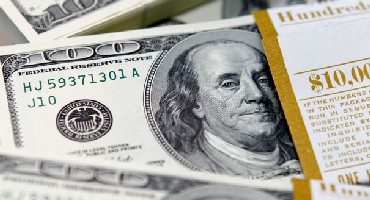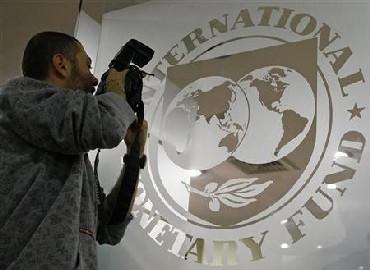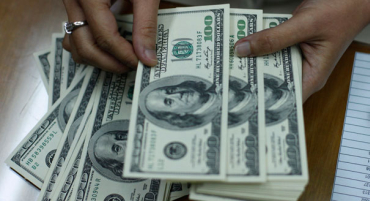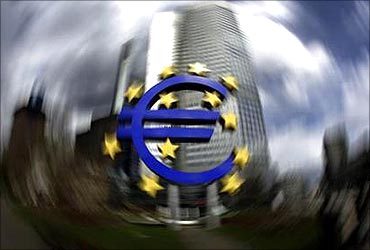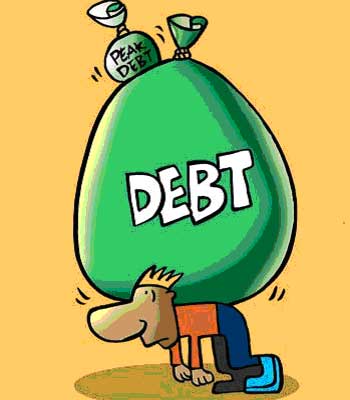 | « Back to article | Print this article |
Biggest worry for economy? Idea-less economists!
Armageddon. Annihilation. Extermination. No. These are not the names of Schwarzenegger movies. Rather they are the terms now used by economists, financial experts and policy analysts to describe, explain and define the precarious state of global economy.
With every passing day, given the data that emerge, one is getting increasingly nervous. Or is there something more fundamental that is making the markets edgy?
The recent Word Economic and Financial Survey carried out by the IMF (September 2011) concludes that the global economy is in a 'dangerous phase'. Notably it points out that global activity has weakened and become more uneven. In the process, confidence in the global economy has fallen sharply in recent months.
It is in this connection that this document points out to the two major crisis areas of the present times -- debt crisis in Europe that runs beyond the control of their policymakers, and deceleration of economic activity in the United States.
In case of Europe (as a policy response the International Monetary Fund suggests), given the declining inflation pressure and heightened financial and sovereign tensions, the European Central Bank should possibly 'lower its policy rate if downside risks to growth persist'.
In case of the US, the IMF is equally concerned about the slowing of economic activity there which it fears could well spiral out of control. Possibly this fear stems from the political impasse over fiscal consolidation witnessed in early August.
Click NEXT to read on . . .
Biggest worry for economy? Idea-less economists!
But it is not merely political impasse in the US that seems to worry the IMF. What is interesting to note here is that the IMF points out to 'weak household market caused by an overhang of excess supply and declining prices'.
According to some reports, the US household market has an excess inventory of about 10 million houses!
All these have exacerbated the fiscal and financial uncertainty with markets becoming increasingly sceptical about the ability of countries to stabilise their public debts.
And that explains why private demand is not picking up, despite significant stimulus offered by several countries.
This problem is further accentuated by the fact that household debt too is at an alarmingly high level in these countries. When unemployment is on the rise, surely households cannot be an engine of growth or expected to spend.
Click NEXT to read on . . .
Biggest worry for economy? Idea-less economists!
Therefore, theoretically increasing public expenditure is possibly the only route to spur growth. But that has the calculated effect of increasing the already gargantuan level of public debt of countries.
The net result: there is a slower-than-anticipated recovery in the economic activity in the developed countries -- an activity that the IMF 'failed to perceive as it was happening'.
In short, while economists world over are spot on about the causes that have triggered this round of loss of confidence, the fact remains they failed to predict them why even 'perceive as it was happening'.
Excellent diagnosis; dodgy prognosis
As a policy prescription the IMF document goes about prescribing two major rebalancing acts -- one shift in the demand from public demand to private demand in the US.
Similarly, it suggests that advanced economies with current account deficits, most notably the US, need to compensate for low domestic demand through an increase in foreign demand.
Click NEXT to read on . . .
Biggest worry for economy? Idea-less economists!
Obviously, this implies a shift away from foreign demand to domestic demand in emerging economies with current account surpluses, most notably China.
And the IMF document confesses that this rebalancing act is not taking place.
To the uninitiated all these may seem to be high end economics, the fact of the matter is that all these have been repeatedly discussed for over a decade or so by various commentators, economists and analysts.
Crucially, most of them have come to a conclusion that nothing much can be prescribed as an alternative to save the global economy.
With no other policy alternatives in sight, naturally, there is a fear of the unknown in global markets. This in turn has led to a freeze in financial flows, as stock prices, commodity prices, real estate and currencies tumbles worldwide.
Click NEXT to read on . . .
Biggest worry for economy? Idea-less economists!
In the process the uncertainty of one market goes on to feed the other, propelling the global economy into a downward spiral with each passing day.
Simply put, it is not a lack of confidence in global economics, worries about burgeoning debts or lack of private demand that is causing the present consternation.
Rather, it is a crisis of confidence on economists, their understanding of economics and the demonstrated limitations in some of their theories in solving the crisis that is triggering the present concern.
No wonder the macroeconomics crisis at the global level is also causing a crisis of macroeconomics. People, including economists, have begun to question the very discipline of macroeconomics in the first place.
According to Nobel Laureate Paul Krugman most macroeconomics of the past 30 years was 'spectacularly useless at best, and positively harmful at worst'.
Click NEXT to read on . . .
Biggest worry for economy? Idea-less economists!
In an article dated July 16, 2009, The Economist comments, 'These internal critics argue that economists missed the origins of the crisis; failed to appreciate its worst symptoms; and cannot now agree about the cure. In other words, economists misread the economy on the way up, misread it on the way down and now mistake the right way out.'
The reason for such confusion in the discipline of macroeconomics is not far to seek, which by its very character a complex subject.
Over the years macroeconomics was reduced by academicians to explaining complexities through modelling as if macroeconomics were toiletries and required models to market them.
Explaining economics through models
Economists are so used to this idea of modelling that they will believe in their own theories and be sanguine about them if and only if they can explain them through models!
Put simply, if there is no model, there is no economic theory.
Click NEXT to read on . . .
Biggest worry for economy? Idea-less economists!
This requires some explanation. The Economist in its July 2009 article points out, 'In the first months of the crisis, macroeconomists reposed great faith in the powers of the US Fed and other central banks. In the summer of 2007, a few weeks after the August liquidity crisis began, Frederic Mishkin, a distinguished academic economist and then a governor of the Fed, gave a reassuring talk at the Federal Reserve Bank of Kansas City's annual symposium in Jackson Hole, Wyoming.'
The article goes on to add, 'He presented the results of simulations from the Fed's FRB/US model. Even if house prices fell by a fifth in the next two years, the slump would knock only 0.25 per cent off GDP, according to his benchmark model, and add only a tenth of a percentage point to the unemployment rate. The reason was that the Fed would respond 'aggressively', by which he meant a cut in the federal funds rate of just one percentage point.'
Mishkin, the article pointed out, concluded that the US Fed had the necessary tools to contain the damage at a 'manageable level'.
Interestingly, since his presentation, the US Fed cut its key rate by five percentage points to a mere 0-0.25 per cent by July 2009. Yet, this has proved to be inadequate and insufficient.
The reason for the same is obvious -- blackboard models developed by theoreticians are inadequate and hence unable to explain global phenomenon and provide solution to the extant crisis.
Click NEXT to read on . . .
Biggest worry for economy? Idea-less economists!
Subsequently economic modelling moved on from blackboard to computers. And economists assumed that their models were complicated ones (and hence infallible), simply because the computations were carried out by the machine!
Yes the models were complex, but the root assumptions governing these models were not.
While the models were indeed were complicated for the common man to comprehend, the fact remains that these were derived from certain broad assumptions and crude generalizations, which in turn characterized their models in first place.
While economists know and admit that such models are inadequate, they can do very little to deviate from such fundamental assumptions that govern the discipline of macroeconomics in the first place. And should they deviate, they can no more be economists in the first place.
It is this fear of being expelled from the pantheons of economists that compels every economist to tinker with the existing and established models on the periphery but never to question the root assumptions that govern the functioning of the model.
Click NEXT to read on . . .
Biggest worry for economy? Idea-less economists!
When have you last seen an economist questioning something very original, something fundamental?
Naturally, economists have a standard tool in raising interest rates (as is being suggested repeatedly in India) to tackle inflation when it is quite obvious that increasing interest rate is in effect not working in the Indian context.
In the alternative they suggest cutting interest rates in Western economies when it is not working there too. Yet they persist with it simply because text book says so.
When it comes to newer prescriptions, there is not much in the form of solution on offer by economists even from the IMF stable.
Every report, including this one in September 2011, is a mere rehash of existing ideas, theories and ideologies.
No wonder markets across the globe are gyrating and collapsing as markets are as much worried about the state of the economy as about the bankruptcy of ideas among economists. And that to me is the biggest worry for the markets.
The author is a Chennai-based chartered accountant. Comments can be sent to mrv@mrv.net.in

